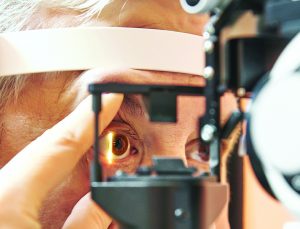

In the eye, the optic nerve transmits images to the brain. When this nerve is damaged or diseased, it looses the ability to create images, and the sight communication to the brain is lost. There are several types of glaucoma, and a buildup of pressure in the eye is the most common cause. This pressure is known as IOP, or intraocular pressure. Disease or damage triggers this pressure in the eye and injures the optic nerve.
Glaucoma is the second leading cause of blindness. People over the age of 60 are within glaucoma’s high-risk group. Regular eye examinations are very important for the elderly, and also for anyone experiencing peripheral vision loss, which is one of the only symptoms of glaucoma.
There are treatment options to prevent further vision loss, but once the damage is done, there is no cure to bring your vision back. Because our eyesight is so important in all of our daily activities and lives, the elderly are often unable to take care of themselves properly once this debilitating disease destroys their sight.
As baby boomers age, there will inevitably be many more cases of glaucoma diagnosed. The medications prescribed are usually in eye drop form. It’s extremely important that patients get the drops into their eyes precisely and on a routine basis. If an elderly person struggles with fine motor skills, dementia (memory loss), or other tasking issues, it is important to have someone help administer the drops or the oral medication daily. If it’s not given on a strict basis, blindness can eventually ravage the sight completely.
For seniors with blindness (partial or total), Pacifica Senior Living offers comprehensive support through well-trained staff. They help with instructional daily living and activities training, as well as mobility exercises, and other social services to help the patient learn to live a more productive life. At Pacifica Senior Living, they can help you make the decisions that are necessary concerning you or your loved one.
Pacifica Senior Living understands that along with providing the best patient care, providing the entire family the support and education they need is essential for enhancing understanding and contentment for families.
Unlike most facilities, their home-like accommodations are custom built to help ease what can be an overwhelming time in life. This is precisely what sets them apart and makes them stand out in the assisted living, skilled nursing and memory care specialty. You have unlimited options with Pacifica Senior Living, please call them to find out more information at 239-829-5291, or visit their website at PacificaFortMyers.com
 Southwest Florida's Health and Wellness Magazine Health and Wellness Articles
Southwest Florida's Health and Wellness Magazine Health and Wellness Articles

